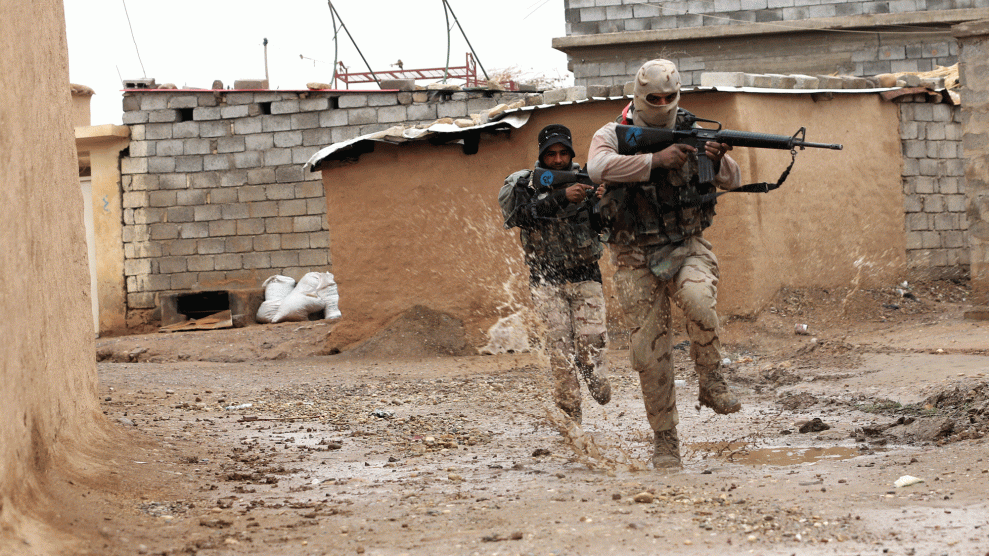
Iraqi soldiers carrying US-miltary style weapons outside Mosul in December 2016. Hadi Mizban/AP
In June 2014, Iraqi forces dropped their weapons, shed their uniforms, and abandoned their posts as ISIS militants stormed into and captured Mosul. More than a year later, the United States began funneling $1.6 billion worth of new weaponry and other support to the beleaguered Iraqi army. The arsenal included tens of thousands of assault rifles, hundreds of armored vehicles, hundreds of mortar rounds, nearly 200 sniper rifles, and other gear.
What happened to much of it is now a mystery. According to a government audit obtained by Amnesty International, the US Army admits that it failed to accurately track this recent infusion of arms and other military supplies.
The now-declassified Department of Defense audit, obtained through a Freedom of Information Act request, reveals that efforts to keep track of weapons being sent to Iraq have been plagued by sloppy, fragmented, and inaccurate record keeping. The audit concluded that the Army unit in charge of transferring materiel to the Iraqi government “could not provide complete data for the quantity and dollar value of equipment on hand”—including large items such as vehicles.
This is not a new development. “If you do look back at previous audits, almost word for word, you get the same recommendations about the fact that they can’t centralize records, they’ve got records spread across different spreadsheets, it’s very difficult for them to locate weapons as they pass down the chain,” says Patrick Wilcken, Amnesty International’s arms control and human rights researcher. He notes that some Iraqi supply records are hand-written paper receipts.
The problem predates the current conflict by more than a decade. In 2007, the Government Accountability Office found that the United States could not account for nearly 30 percent of the weapons it had distributed in Iraq since 2004—about 200,000 guns. The situation does not appear to have improved much since then. In 2015, the Pentagon’s inspector general reported that the Iraqi army relies on “a manual, paper-based system for tracking supplies and equipment.” Even US and Iraqi personnel supervising arms depots did not know where specific weapons were supposed to be. Last year, Commander Elissa Smith, a Defense Department spokeswoman, told Mother Jones, “The bottom line is that the US military does not have a means to track equipment that has been taken from the government of Iraq by” ISIS.

The most recent audit notes that the Army couldn’t even tell whether certain equipment was in Kuwait or Iraq. It also claims that once military gear is transferred to the Iraqis, “it is no longer U.S. Government property” and the Pentagon “is relieved of responsibility to account for the equipment.” The Pentagon’s Golden Sentry program, however, requires that military supplies sent to foreign governments must be checked after delivery to ensure they are being used properly.
US-manufactured and supplied weapons in Iraq have made their way into the hands of ISIS fighters as well as paramilitary militias such as the Iranian-backed Popular Mobilization Units that have carried out summary executions, torture, and disappearances. Some of those militias have officially been incorporated into the Iraqi military. “This has been a constant feature of the Middle East and arms transfers,” Wilcken says. “Weapons go in, and maybe they serve their purpose for a short time, and then they come back to bite the suppliers. In Iraq, the weapons are not just spreading out into armed groups operating in Iraq but filtering back into the Syrian conflict as well.”
“There is a critical security situation in Iraq,” says Wilcken. Yet he says that funneling weapons into the country without effective monitoring fuels arms proliferation as well as human rights violations throughout the region. “If the [the United States is] investing billions of dollars in equipment, training, and assistance to the Iraqi army but not spending a little extra to ensure that this can lead to a long-term sustainable security solution, then that’s a distortion of their investments. They should be doubling down on securing arms supplies and checking that they’re not being handed out to serial violators.”
















